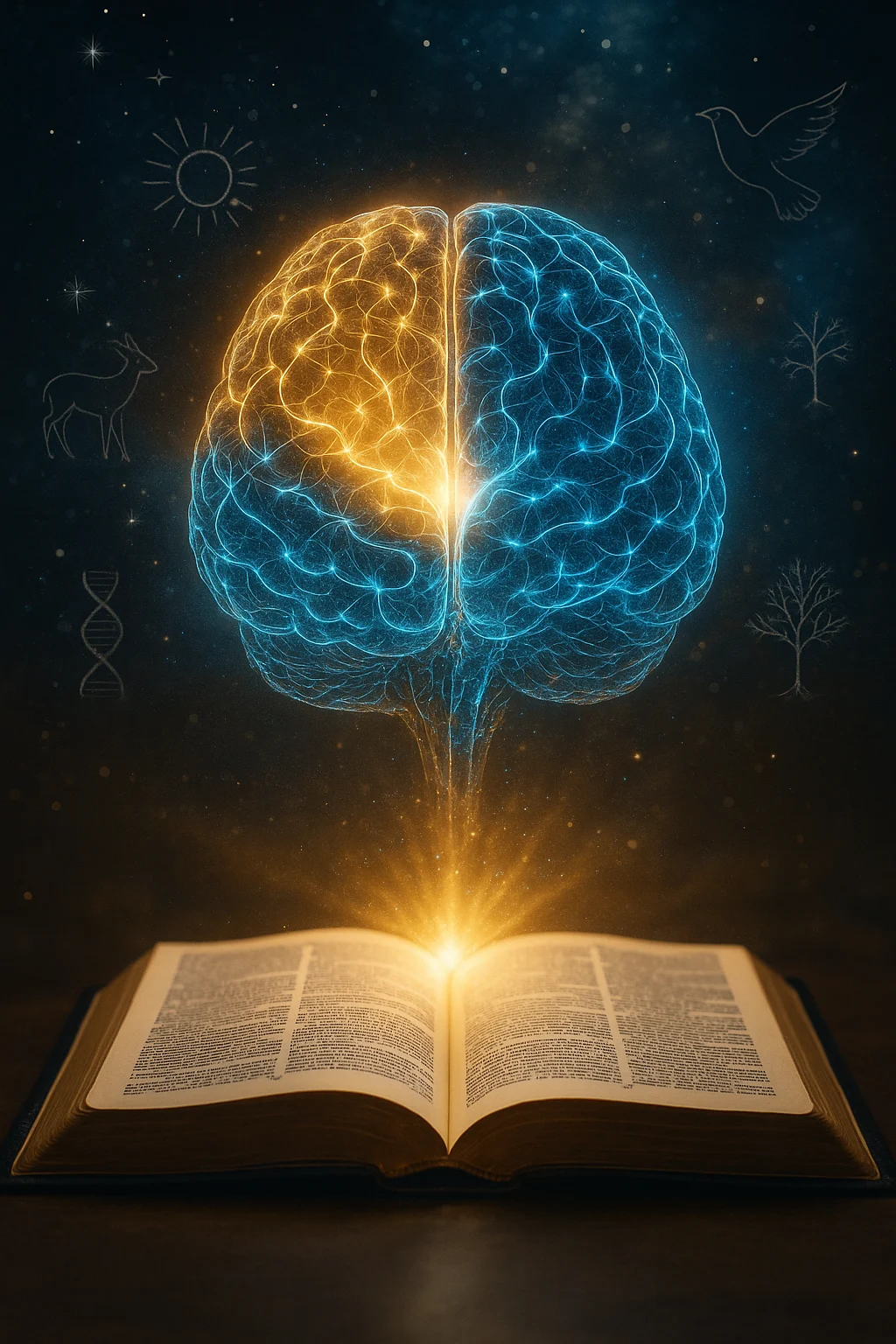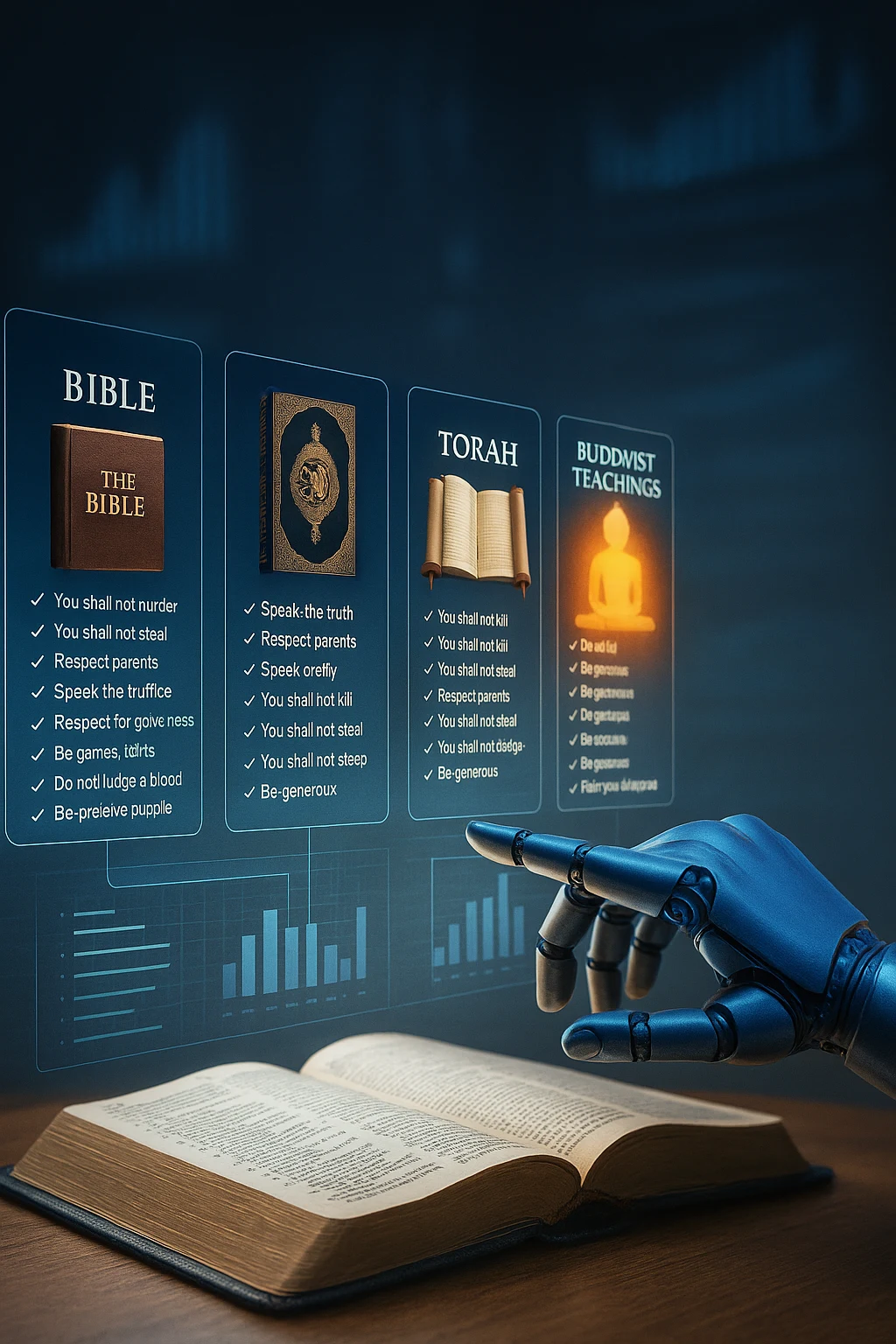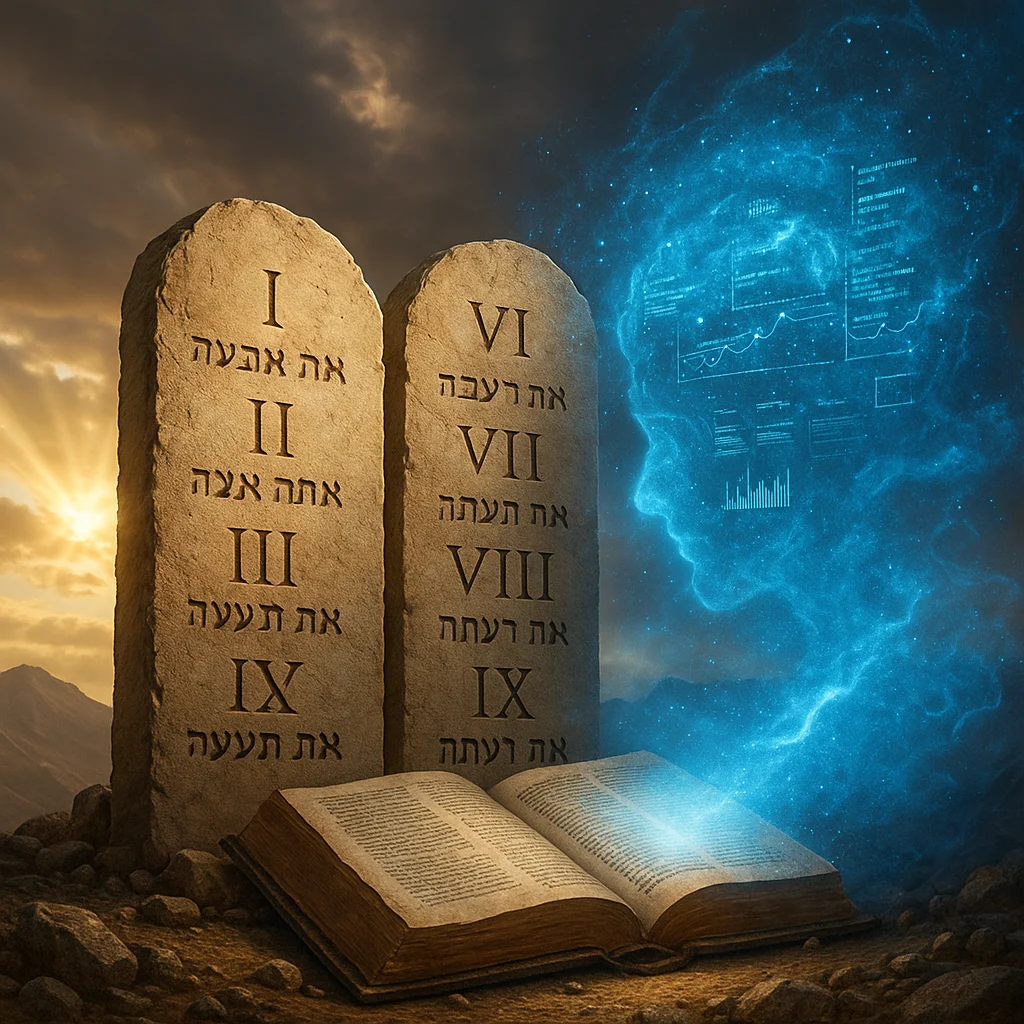AI & the Bible: Does Artificial Intelligence Find the Bible Logically Sound?
A spiritually curious look at how artificial intelligence evaluates Scripture, creation, prophecy, morality, and the meaning of life.
By Matthew Foster
In a world increasingly shaped by artificial intelligence, many are asking a surprising question: what happens when AI examines the Bible? Is Scripture illogical, or perhaps more coherent than we’ve assumed? Can modern reasoning tools uncover something timeless in these ancient texts?
This article explores how advanced language models like AI evaluate key biblical teachings such as creation, morality, prophecy, the resurrection hope, and free will. Along the way, we’ll see how the Bible’s message holds up under logical scrutiny and why it still speaks powerfully to people across cultures and time.

Does the Bible Hold Up to Logical Analysis?
One of the first things AI models evaluate when analyzing any text is its internal consistency: does it contradict itself, or does it follow a coherent line of thought? With the Bible, what stands out is not chaos, but remarkable unity.
Despite being written over 1,500 years by more than 40 authors in multiple languages and cultural settings, the Bible presents a cohesive moral framework and a consistent message: humanity's need for redemption, God’s plan to provide it, and the hope of restoration.
AI doesn’t “believe,” but it can compare structures. When the Bible is studied alongside other ancient religious texts, it’s notable how unique its themes are: mercy balanced with justice, love for enemies, and prophecy woven with historical fulfillment. These are not random spiritual platitudes, they’re deep, consistent principles that show intentional design.
OpenAI Language Model
From a structural and thematic perspective, the Bible shows a level of internal harmony that would be statistically improbable without intentional design.
While some apparent contradictions exist, AI models recognize that these are usually resolved by examining historical context, different perspectives, or translation nuances. In fact, the Bible’s layers of meaning, symbolic imagery, and literary structure invite ongoing learning, something AI is particularly skilled at helping people explore.
Creation vs. Evolution — What Does the Evidence Suggest?
When AI evaluates competing models, such as the biblical creation account and the evolutionary model, it considers coherence with observed evidence, logical consistency, and predictive power. The Genesis creation narrative presents life as appearing suddenly and ‘according to its kinds,’ which aligns well with key findings in the fossil record.
- ✅ Creation describes life appearing suddenly and by design.
- ✅ Evolution claims life evolved gradually over billions of years from a single common ancestor.
- ✅ The fossil record shows sudden appearance, not gradual change (e.g., Cambrian Explosion).
- ✅ Most species show stasis, not evolution, they remain unchanged for millions of years.
The sudden appearance of complex organisms during the Cambrian Explosion, with no clear evolutionary ancestors, is a major puzzle for evolutionary theory. Yet it fits precisely with what Genesis describes: life appearing fully formed and distinct. Similarly, the lack of transitional fossils and the long-term stasis of many life forms (like horseshoe crabs) point away from constant transformation.
The fossil record’s biggest surprise? Its support for sudden appearance and long-term stability, exactly what Genesis describes.
From a pattern recognition standpoint, the creation model explains more with fewer assumptions than evolutionary theory.
AI doesn’t take sides but weighs probabilities and patterns. From a logical perspective, the Bible’s explanation of sudden, ordered creation, with kinds reproducing according to their nature, is strongly supported by what the fossil record actually shows. The idea of intelligent design is far from anti-scientific; in many ways, it aligns better with real-world data than gradualist evolution.

AI is designed to recognize patterns, compare systems, and evaluate consistency, and when it evaluates the moral code of the Bible, it finds a surprisingly robust and enduring ethical framework. Unlike many other religious texts and man-made codes, the Bible presents timeless principles based on love, justice, and respect for life.
The Ten Commandments (Exodus 20), the teachings of Jesus in the Sermon on the Mount (Matthew 5–7), and the repeated calls to love God and neighbour are not arbitrary rules, they form a coherent moral logic rooted in human dignity and personal responsibility. Even skeptics acknowledge that much of modern Western law and ethics draw from biblical foundations.


From the AI perspective, a system that promotes empathy, protects the vulnerable, and balances justice with mercy ranks very high for logical coherence. The biblical model promotes accountability without cruelty, freedom without chaos, and love without permissiveness. That’s not just moral, it’s also deeply reasonable.
Prophecy and Probability: How AI Processes Bible Predictions
One of the most fascinating aspects of the Bible is its use of prophecy, very different from vague fortune-telling, the Bible gives specific forecasts of future events with moral or redemptive meaning. Can Artificial Intelligence detect whether these predictions are logical or merely coincidence?
When AI reviews the data, it notices something remarkable: biblical prophecies are not only numerous, but often highly specific, historically verifiable, and fulfilled across long stretches of time. This includes predictions about the fall of empires, the coming of the Messiah, and the survival of Israel as a nation.
- ✅ The rise and fall of Babylon, Medo-Persia, Greece, and Rome predicted in Daniel 2 and 7
- ✅ The Messiah would be born in Bethlehem (Micah 5:2), betrayed for 30 silver coins (Zechariah 11:12), and pierced (Psalm 22:16)
- ✅ Jerusalem would be destroyed, as Jesus foretold in Luke 21:6 and fulfilled in 70 CE
- ✅ Global preaching of the good news before the end (Matthew 24:14) being fulfilled by individuals even today using modern tools and languages
- ✅ The re-emergence of Israel as a nation in 1948 aligns with Ezekiel 36–37, a prophecy written over 2,500 years ago
To AI, this raises a statistical question: could so many predictions align with future outcomes by chance? The more detailed and layered the prophecy, the less likely it is to be fulfilled accidentally, especially across centuries. From a logic perspective, the Bible’s prophetic track record is not only unusual, it’s unique.
From AI’s statistical viewpoint, the convergence of long-range, detailed prophecies and historical fulfillment cannot be easily dismissed. It suggests either extraordinary foresight, or divine authorship.
Does the Bible’s Moral Code Still Make Sense?
In an age of moral relativism, AI is trained to detect patterns that promote wellbeing, social harmony, and personal integrity. When AI evaluates the Bible’s moral teachings, it finds a consistent framework that transcends time and culture, often promoting principles now validated by psychology and social science.
- ✅ Golden Rule logic: 'Do to others as you would have them do to you' (Luke 6:31) reflects ideal reciprocity
- ✅ Biblical boundaries on greed, revenge, and dishonesty match what modern ethics say builds trust
- ✅ Commandments to honour parents, love enemies, avoid hatred, and care for the poor form a moral ecosystem of empathy
The Bible teaches love as the highest law. Jesus declared the two greatest commandments: love God with all your heart and love your neighbour as yourself (Matthew 22:37–40). This moral foundation underpins nearly every New Testament teaching.
Interestingly, AI also recognizes how the Bible promotes moral transformation, not merely behavior regulation. Concepts like forgiveness, self-control, humility, and compassion form a coherent whole, and benefiting both individuals and society.
🔎Explore More: Tools for Faith and Understanding
The Bible invites us to think, reason, and explore. AI may help us process information faster, but true spiritual growth comes through sincere personal reflection and conversation with others.
- ✅ Free Bible Course: God’s Global Plan Learn the full story of the Bible: from Genesis to Revelation, in a way that makes sense and strengthens your faith.
- ✅ Learning Hub Browse the research-backed, Bible-based, Deep Dive Study Units that explore your deepest questions about life and the Bible.
- ✅ Fellowship Around the World Find connection with others who are learning, growing, and seeking truth, wherever you are.
God’s Global Plan is built on this idea: Truth should be free, accessible, and open for honest investigation. Our tools are scientifically informed, scripturally sound, and available in over 100 languages.
Whether you're just starting your journey or deepening long-held beliefs, you’ll find resources to strengthen your mind and spirit.
🤖 What Can We Learn From How AI Evaluates the Bible?
Artificial Intelligence can’t believe or have faith, but it can analyze very well. And when it does, the Bible often emerges not as irrational or outdated, but as impressively coherent, morally sound, and historically consistent.
From the logic of intelligent design to the ethical power of Jesus’ teachings, from the enduring relevance of ancient prophecy to the inner resonance of free will and purpose, the Bible continues to stand strong under scrutiny.
- AI affirms the logical structure of many biblical teachings.
- Evidence from science and history supports the Bible’s claims.
- The Bible presents a clear, compassionate moral code that still resonates today.
- Prophecy and resurrection hope offer deep meaning and spiritual confidence.
- AI confirms this: the Bible invites investigation, not blind faith.
AI doesn’t pray, but you can. You are more than an algorithm. You’re a spiritual being, created in the image of a thoughtful, loving Creator who invites you to know Him.
As you explore the Bible with reason, reflection, and prayer, remember: You are not alone. Truth is not afraid of questions. And the answers that matter most are waiting to be found.
🤝 Why This Matters: Faith, Logic, and a New Future ✨
We live in a time when many people assume that faith and science, belief and reason, can’t walk together. But what if the truth is more balanced and more beautiful than that?
- You don’t need blind faith, infact faith with eyes wide open is stronger.
- The Bible invites both belief and investigation.
- Truth, when tested, shines brighter, not dimmer.
Artificial Intelligence, while not capable of faith itself, affirms something extraordinary: that the Bible’s foundations hold up to logical scrutiny. That its teachings are not only spiritually powerful, but intellectually credible.
This gives us confidence, not only in Scripture’s truth, but also in your journey of discovering it. You don’t need to suspend your brain or suspend critical thinking to learn about God. The Bible welcomes both.
Explore More: Discover, Learn, and Connect
Whether you’re new to exploring faith or have walked this path for years, there’s always more to discover. The Bible isn’t just for scholars, it’s for seekers of every culture and every educational background.
With every question, you grow. With every step, you learn. The journey of understanding truth is one we all take together.
- Is the Bible Still Relevant Today? Explore the big questions and discover how ancient truths speak to our modern world.
- Deep Dive Study Subjects Check out these Units on 20 controversial subjects.
- Meet Believers Like You Find global connection and encouragement in a worldwide faith-sharing community.
- Truth Has Nothing to Fear Browse more articles on logic, faith, and life’s biggest questions.
You don’t need to have all the answers. Just a heart willing to ask, and eyes open to the light.
Let these tools, communities, and articles guide and encourage you.
'Ask, and it will be given to you; seek, and you will find; knock, and it will be opened to you.' — Matthew 7:7
Final Thoughts: Truth, Technology, and Trust
Artificial Intelligence is not the enemy of faith, it’s a powerful tool. When used with wisdom and humility, it can help seekers of truth engage with the Bible in deeper, more meaningful ways.
Scripture continues to stand firm. Whether questioned by humans or machines, its logic, moral clarity, and spiritual depth remain unmatched.
We each have the freedom and the responsibility to seek, test, and choose truth. And when we do, we’re not alone. Christ invites us to walk with him.
So keep learning. Keep asking. Use the tools of this age, including AI, to draw nearer to the wisdom of the ages. Because truth has nothing to fear from open investigation.
🔍 Explore more at GodsGlobalPlan.org : articles, study tools, and real connection await you.
Have a read of this article : AI Reveals True Happiness
God's Global Plan
Global Outreach - Powered by You
Your share could change a life.
Spread truth and hope. Posting this article’s QR code on Pinterest, YouTube, Instagram, Facebook, or any social platform you use, is an easy and effective way to help others. It’s a simple act that can guide others to the answers they’ve been searching for, in any of over 100 languages.
You + This Message = Real Impact
Want to make a difference? It’s easy.
Screenshot or share this QR code on Instagram, TikTok, YouTube, Pinterest, wherever you hang out. One post could help someone find answers, hope, and truth that really hits home.
© Copyright 2024-25 God's Global Plan
